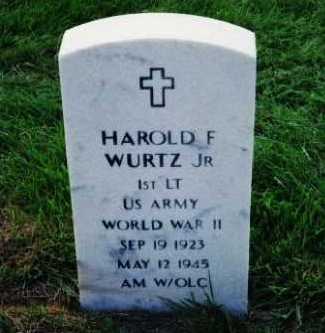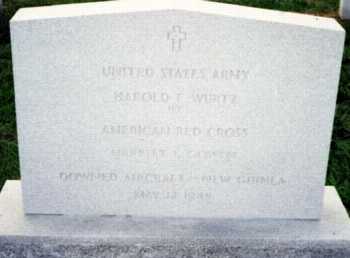Harold F Wurtz Jr. and Harriet E Gowen
The Missing Americans
By May, 1945 the war had largely moved beyond New Guinea. Where from 1942 through 1944 the Americans and Australians had been in constant battle to turn back the Japanese forces that threatened Australia, by 1945 allied forces controlled New Guinea’s coast, denying the Japanese the ability to re-supply themselves. Now the war had moved inland where smaller groups of Allied troops, supported by the Air Corp, harassed the remaining Japanese. Lt. Harold Wurtz, Jr. age 21, son of long time Dearborn, Michigan residents Harold Wurtz Sr. and Gretna Wurtz was among those airmen. He flew a P-47 Thunderbolt fighter plane out of the large base at Nadzab. His brother, Kenneth R Wurtz remembers his big brother as shy on the ground, but as bold in the cockpit. He cherishes the memory of his older brother, in training in Mississippi, ordering Kenneth to wait on a bridge over a nearby river- which Harold then flew under.
"He came up the river about 10 feet off the water."
Harold’s posting in Nadzab, New Guinea was a major base, one of the largest in the Southwest Pacific, and it had a full time Red Cross presence. Harriet Gowen was a trained nurse and a Recreation Specialist at the base hospital. She was age 28 in 1945, raised in Stillwater, MN. A petite, vivacious girl with an adventurous temperament, Harriet and “Junior” Wurtz made friends at the base. While each was dating others, theirs was a close friendship, with each writing home of the other. Wurtz had a picture of a woman -- his brother assumes it's Gowen -- with "Our Red Cross Worker" written on it. In her personal effects, Gowen had picture of Wurtz with "Hot Pilot" written over it.
On May 12, 1945 Lt. Wurtz invited Harriet on a joy ride in his P-47. Although the plane was designed for only 1 passenger, if the parachute was removed a second could piggyback along. At 2 PM that afternoon, the plane took off into sunny skies, and was never seen again. For 3 days the Air Corp searched for the plane, but nothing was sited. One witness, an American pilot, reported seeing a plane that might have been Lt. Wurtz’ stalled and spinning, but no confirmation was found.
Harriet’s niece, Ann Freeman, says it was no surprise to her family that Harriet would want to go along. She was, after all, an adventurer.
Both sets of parents took their children’s loss hard. Five years after the war ended Lt. Wurtz’ mother was still writing to the US Army. His mother, who died in 1992 at age 96, had written several letters to the Army Air Forces pleading for more information on her son, whom she thought had flown alone the day he disappeared. In one letter dated Dec. 9, 1946, she wrote: "I guess you realize the mothers can never give up their boys that they love so much." In a note from May 25, 1950, she wrote: "I will never get over the loss of Harold until he is found. Are they still searching at all?" Mrs. Gowen never gave up hope of her daughter's return, buying Harriet a plot and erecting a tombstone next to hers in expectation of Harriet’s eventual return. Sadly, both sets of parents, and most of the missings' siblings, died without hearing anything else.
The Discovery
The villagers of Morobe Province in modern Papua New Guinea are several generations removed from the war, but they well remember the stories of their parents and grandparent of the war. How brutal the Japanese occupation was, how well they were treated when employed by the Americans and, on occasion, the risks the Americans took in working with villagers during fire fights. Theirs is a much different lifestyle than the American’s, but the relationships the two peoples built in the 1940’s are still valued. In the words of the natives, our clans are allies.
In 1996, Moses Paul and two fellow villagers took the village’s gun, its single bullet and their spears on a wild boar hunt. When they reached an area they believed to be haunted, two hunters dropped out, fearing the story they'd heard over the years: When you get to the haunted place, the ground will shake and you will hear engine noises. Moses Paul pressed on with the rifle and its single bullet. When he reached the forbidden territory, he said later, the ground shook and he heard engine noises. He was determined to see what was making the racket. He lay down by a tree and went to sleep. When he woke in daylight, he saw a huge hole in the ground and a piece of metal sticking out. He ran back to the village and got others to help him dig out the metal. They found more metal. And pieces of airplane. And human bones. And teeth. And the black oval frames of a woman's glasses. And the dog tags of Lt. Harold Wurtz.
The site was five miles from the airstrip where Wurtz had taken off; in an area that was swamp in 1945.
A Lutheran church worker in a nearby town heard about the discovery. He faxed the news to another church worker, who by coincidence, lived in Minnesota. The church worker contacted a radio newsman, who contacted Bryan Moon, a former Northwest Airlines executive who is interested in the recovery of World War II aircraft.
Moon searched declassified Air Force reports and found the missing craft report. With that, and Wurtz's dog tags, he knew the natives must have found the crash site. He decided to go to New Guinea to find out what he could.
"This was something we wanted to do," Moon says. "There were two people who'd been missing for 52 years, and it seemed liked somebody ought to go and bring them back."
Moon and his son lived with the villagers for two weeks, gathering information on the crash site and remains, information they forwarded to the U.S. Army. Along with the remains and personal effects, they saw pieces of the Thunderbolt's fuselage and tail wings, four propellers, the main wheels and tail wheel assembly.
The Army identified the remains as those of Wurtz and Gowen. Moon later talked to Wurtz' squadron commander, who said he believed that Wurtz took up a plane that had just returned from a mission and had not been refueled. The plane, Moon believes, could have run out of fuel, a frequent cause of private plane crashes.
"People make the same mistakes in the military," says Moon, an Englishman who served in the Royal Air Force just after World War II.
The no-fuel scenario would be consistent with the report of a plane in a spin at 3,000 feet, Moon says. The P-47 was a heavy plane with no gliding ability. The disintegration of wreckage at the crash site suggests that the plane was going very fast when it hit the ground.
Harriet Gowen's nephew, Ernest Peaslee of Stillwater, Minn., was getting dressed for church and listening to the radio when news of the discovery hit airwaves there. "When they said a nurse and a pilot in a single-seater in New Guinea, I put two and two together," said the 68-year-old man who was 17 when his aunt disappeared. "This is unbelievable and fantastic. I just hope we'll be able to bring her home and have a burial." Peaslee said Wurtz was one of Gowan's friends during the war. "It was a case where a young pilot told a young gal, 'You want to take a ride in a fighter plane?' and she took him up on it. She was a fun-loving gal," he said. "It's something she would've done."
In August, 1999, Kenneth Wurtz, Ann Freeman and other family members watched as the remains of Lt. Harold Wurtz and some indistinguishable remains -- his and hers -- were lowered into the ground at Arlington. Taps was played and rifles fired, as the casket was buried with full military honors.
The following Friday, the remains positively identified as Harriet Gowen's were buried next to her mother in a small church cemetery in Minnesota.
Freeman, who moved to Greensboro with her husband, Charles, now a retired Burlington Industries employee, says she has no bitterness about how her aunt died, even if it was caused by pilot error. Gowen, who talked about learning to fly herself, came from a family of adventurous women.
Deciding to take an afternoon flight would be in keeping with her aunt's fun-loving character.
"I'd do the same thing, absolutely, if I felt the guy was competent and the weather was fine," Freeman says.
Thank you: Bryan Moon


